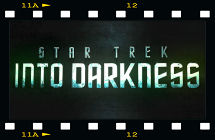 Stardate 2259.55: After recklessly risking his ship in a first contact situation where he ends up throwing the Prime Directive to the wind, Captain James T. Kirk is relieved of command and busted down in rank; the Enterprise is reassigned to the command of Admiral Pike and Kirk is demoted to his first officer. Spock is scheduled to be reassigned to another ship as first officer.
Stardate 2259.55: After recklessly risking his ship in a first contact situation where he ends up throwing the Prime Directive to the wind, Captain James T. Kirk is relieved of command and busted down in rank; the Enterprise is reassigned to the command of Admiral Pike and Kirk is demoted to his first officer. Spock is scheduled to be reassigned to another ship as first officer.
After an explosion at a Starfleet facility on Earth is revealed to be the work of a Starfleet officer, the Starfleet admiralty is summoned to an emergency meeting, where it is revealed that the mastermind behind the explosion, Commander John Harrison, is still at large. Top priority is given to finding and eliminating Harrison. But Kirk quickly realizes that Harrison will come to them: a vehicle arrives just outside of Starfleet HQ and begins firing into the conference room. Admiral Pike is killed, and Kirk personally takes down Harrison’s ship, but the mysterious officer escapes, miraculously unharmed, and beams out using the long-range transporter technology invented by Scotty. Kirk tracks Harrison to the Klingon homeworld and requests the reinstatement of his command of the Enterprise. Admiral Marcus agrees, and provides Kirk with a new top secret weapon, long-range photon torpedoes, to carry out a shocking order: take Harrison out on the Klingon planet, even if it starts a war with the Klingons (which Marcus feels is inevitable already).
On the Klingon homeworld, Kirk elects not to use Marcus’ weapons, instead beaming down to personally capture Harrison. A fierce firefight ensues between Kirk’s landing party, Harrison, and the Klingons, but to Kirk’s surprise, Harrison surrenders himself willingly upon learning that the Enterprise has advanced torpedoes trained on his location. Once in custody aboard the Enterprise, he suggests that Kirk open one of the weapons. The torpedoes have built-in safeguards against being opened, but once defused, each torpedo is revealed to have a cryogenically frozen human being inside, each one a specimen of genetically enhanced “superhumans” created to fight in a 21st century conflict. And Harrison isn’t even really Harrison – he is the leader of these enhanced humans, blackmailed into cooperating with a top secret warfare division within Starfleet, which is expecting conflict with the Klingons.
Right on cue, a huge Starfleet ship appears, dwarfing the Enterprise. The U.S.S. Vengeance, commanded by Admiral Marcus (who is, curiously, out of uniform), takes an aggressive position against the Enterprise, and Marcus demands that Kirk surrender “Harrison” and his fellow augmented humans. Kirk refuses Marcus’ order, certain that Starfleet shouldn’t be on a war footing. But can he place any more trust in Harrison, who has already committed acts of mass murder? And can he fight both adversaries without sacrificing the Enterprise and her crew in the process?
screenplay by Roberto Orci, Alex Kurtzman & Damon Lindelof
directed by J.J. Abrams
music by Michael Giacchino
LogBook entry and review by Earl Green
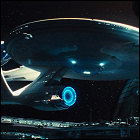 Review: Sometimes I have to remind myself that, much like my other favorite major science fiction franchise, Star Trek is running up on half a century. It’s inevitable that some themes, ideas, and even whole stories will be repeated, revisited, and freshened up for a new audience. I was not expecting Star Trek Into Darkness to resemble past Star Trek movies; this is a big-budget, studio-tentpole film made in 2013, carefully calculated and designed to be a summer blockbuster. I know it’s going to be a lot of flash and bang, quick edits, dizzying action, and will probably, in no small way, glorify violence and a revenge motive that naturally justifies further violence. In short, I’m not expecting The Cage or anything like it, which would almost certainly be considered too cerebral.
Review: Sometimes I have to remind myself that, much like my other favorite major science fiction franchise, Star Trek is running up on half a century. It’s inevitable that some themes, ideas, and even whole stories will be repeated, revisited, and freshened up for a new audience. I was not expecting Star Trek Into Darkness to resemble past Star Trek movies; this is a big-budget, studio-tentpole film made in 2013, carefully calculated and designed to be a summer blockbuster. I know it’s going to be a lot of flash and bang, quick edits, dizzying action, and will probably, in no small way, glorify violence and a revenge motive that naturally justifies further violence. In short, I’m not expecting The Cage or anything like it, which would almost certainly be considered too cerebral.
But even with all of that in mind, I was expecting more, and better, than this. Star Trek Into Darkness carves up Space Seed and The Wrath Of Khan into little pieces and then plays them back in shuffle mode, with a few bits borrowed from Star Trek VI as well.
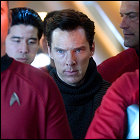 And why not? Since the summer of 1982, the bar for Star Trek on the big screen was raised to an improbably high level by Nick Meyer. When the Next Generation crew migrated to the movies, Star Trek II was the template for their two most action-oriented movies, with Star Trek: Nemesis in particular aping the story structure of Star Trek II to a nearly slavish degree. To put it mildly, nearly every other director to have taken a crack at big-screen Trek has tried to mimic some element of The Wrath Of Khan.
And why not? Since the summer of 1982, the bar for Star Trek on the big screen was raised to an improbably high level by Nick Meyer. When the Next Generation crew migrated to the movies, Star Trek II was the template for their two most action-oriented movies, with Star Trek: Nemesis in particular aping the story structure of Star Trek II to a nearly slavish degree. To put it mildly, nearly every other director to have taken a crack at big-screen Trek has tried to mimic some element of The Wrath Of Khan.
But Star Trek Into Darkness doesn’t merely pay homage; it hits the repeat play button, cramming bits of Khan’s Space Seed origin story into the story Cuisinart with much of The Wrath Of Khan, trying to shake things up by reversing the roles of the stories’ major players toward the end. By the time we see Spock screaming “KHAAAAAAAAAAN!”, the replay has lost its shock value and is firmly into eye-rolling territory, because entire scenes are being repeated almost verbatim.
Into Darkness isn’t completely invalid as a moviegoing experience, but it’s a perfect example of what has happened to cinematic storytelling in the past 31 years: character has given way to catchphrases, and plotting is frequently set aside in favor of parkour. The new faces of the familiar crew are 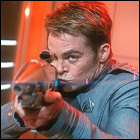 settling into their roles nicely, and Pine and Quinto especially get substantial material to sink their teeth into (briefly, between action scenes). As much as I expected them to be blown out of the water by Benedict Cumberbatch, they’re not: as Khan (the “John Harrison” pretense is kept up for less than half of the movie), the versatile British actor is reduced to menacing pronouncements and threats. If you’ve seen Sherlock at all, Cumberbatch is good – really good. One might have expected him to surpass Ricardo Montalban in the role, except that the script all but turns Khan into Hannibal Lecter, being menacing behind a glass wall, and Cumberbatch completely lacks the sheer intimidating physicality that Montalban brought to the role.
settling into their roles nicely, and Pine and Quinto especially get substantial material to sink their teeth into (briefly, between action scenes). As much as I expected them to be blown out of the water by Benedict Cumberbatch, they’re not: as Khan (the “John Harrison” pretense is kept up for less than half of the movie), the versatile British actor is reduced to menacing pronouncements and threats. If you’ve seen Sherlock at all, Cumberbatch is good – really good. One might have expected him to surpass Ricardo Montalban in the role, except that the script all but turns Khan into Hannibal Lecter, being menacing behind a glass wall, and Cumberbatch completely lacks the sheer intimidating physicality that Montalban brought to the role.
There’s so much meat that could have driven the story, but ultimately gets left at the table in favor of eye candy. The notion of Pike as Kirk’s surrogate father is hinted at strongly here, but isn’t played out to full effect (and Pike’s role in this movie is so minimal as to be a waste of Bruce Greenwood’s talent), only serving 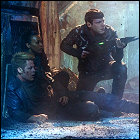 as Kirk’s latest revenge motive, since the 2009 movie played out the previous revenge motive involving Kirk’s real father. The barely-hinted-at idea that Nero’s attack in the 2009 movie gave the hawkish elements within Starfleet and the Federation the opening they needed to push an aggressivley hardline military agenda is fascinating stuff; it’s also apparently going to have to wait for the novels or some other media to address it, because it’s mere wallpaper here, with a few earnestly anguished token reminders that Starfleet is an exploratory body rather than a branch of the military. Ultimately, with its allusions to the modern fear of terrorist attacks, Star Trek Into Darkness is an easily-dated commentary on the first decade of the 21st century, and it’s no more effective a commentary on that topic than the mostly-wasted third season of Star Trek: Enterprise.
as Kirk’s latest revenge motive, since the 2009 movie played out the previous revenge motive involving Kirk’s real father. The barely-hinted-at idea that Nero’s attack in the 2009 movie gave the hawkish elements within Starfleet and the Federation the opening they needed to push an aggressivley hardline military agenda is fascinating stuff; it’s also apparently going to have to wait for the novels or some other media to address it, because it’s mere wallpaper here, with a few earnestly anguished token reminders that Starfleet is an exploratory body rather than a branch of the military. Ultimately, with its allusions to the modern fear of terrorist attacks, Star Trek Into Darkness is an easily-dated commentary on the first decade of the 21st century, and it’s no more effective a commentary on that topic than the mostly-wasted third season of Star Trek: Enterprise.
But the biggest eye-roller of Into Darkness is the wink-and-nod-to-the-audience reappearance of the prime timeline’s Spock, still stranded in this alternate reality and living on New Vulcan. A very cheap and dangerous precedent is set up by having Spock reappear and, after a token admonishment to the younger Spock against tainting the timeline, offer advice to the new Enterprise crew. We now know that New Spock can ring up Old Spock at any time and obtain insider info from the other universe. It would’ve been much more effective had the original Spock’s advice backfired; instead, it simply tells us that things will play out more or less parallel to the original timeline, with a few differences here and there.
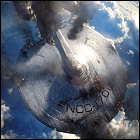 And that, ultimately, is my biggest beef with Star Trek Into Darkness. When I reviewed the 2009 Star Trek movie, there were already fans pondering whether or not the next movie would be a modernized retelling of Star Trek II. The biggest disappointment is that this is exactly what it turned out to be. The “new movie take on original series stories” gag played out much better in IDW’s comics; the resources and expense of mounting a second movie would have been better spent on an original story whose twists and turns we couldn’t see coming from miles away (likely too much to ask in the carefully-calculated, risk-averse gestation vat from which summer popcorn movies spring into life). And the elaborate lengths to which J.J. Abrams and company went to protect the secret – that the sequel really was The Wrath Of Khan v2.0 – would seem to indicate that the makers of the movie knew they’d be facing the internet’s self-appointed fan firing squad once the word got out.
And that, ultimately, is my biggest beef with Star Trek Into Darkness. When I reviewed the 2009 Star Trek movie, there were already fans pondering whether or not the next movie would be a modernized retelling of Star Trek II. The biggest disappointment is that this is exactly what it turned out to be. The “new movie take on original series stories” gag played out much better in IDW’s comics; the resources and expense of mounting a second movie would have been better spent on an original story whose twists and turns we couldn’t see coming from miles away (likely too much to ask in the carefully-calculated, risk-averse gestation vat from which summer popcorn movies spring into life). And the elaborate lengths to which J.J. Abrams and company went to protect the secret – that the sequel really was The Wrath Of Khan v2.0 – would seem to indicate that the makers of the movie knew they’d be facing the internet’s self-appointed fan firing squad once the word got out.
But The Wrath Of Khan is 31 years old as of Into Darkness‘ release date. Sensibilities have changed, as has familiarity with the franchise. I’ll acknowledge that this movie was probably not made for me; it was made for a generation that doesn’t remember the original series and would probably find its relatively languid pacing intolerably slow. And, as with George Lucas’ special editions of Star Wars (and it’s the height of irony to cite that as a parallel, given that J.J. Abrams’ next assignment is Star Wars Episode VII) or the remastered 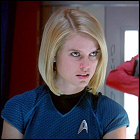 episodes of classic Trek with new CGI effects shots, I didn’t have to hand in my DVD of Star Trek II to gain admittance to the theater.
episodes of classic Trek with new CGI effects shots, I didn’t have to hand in my DVD of Star Trek II to gain admittance to the theater.
The Wrath Of Khan still isn’t dead, as long as we remember; it also has yet to be surpassed. And that’s why Abrams and company really should’ve known better than to try to retell it. They should have known that comparisons would be inevitable and, in some cases, unfavorable (I don’t pretend that my opinion is in majority here; if viewers find something of value here that I didn’t, that’s great).
The whole point of 2009’s movie was to point up that this was a Star Trek in a new timeline; to retell one of the original timeline’s most iconic stories squanders the wide-open potential left dangling by the 2009 movie. Into Darkness turns “Spock Prime” into the elephant in the engine room of the revived franchise: why build connecting tissue to the original franchise at all if you’re simply wanting to play Star Trek’s Greatest Hits with carefully cherry-picked pieces of the mythology, without being beholden to what came before? In principle, I don’t object to a modernized, even politicized, retelling of The Wrath Of Khan; I find it a little bit disappointing and predictable, sure. What I do take issue with, however, is the wholesale recycling of scenes and dialogue, and the cheap cop-out of having the original Spock give us a shortcut to the payoff. The reason Star Trek II is so frequently considered the high-water mark of big-screen Star Trek is that it had a beautiful story structure that built towards its climax both logically and with gut-wrenchingly emotional inevitability. By comparison, Into 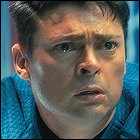 Darkness feels like it lurches toward the end credits with more style than substance, topping the cake with a wink toward the audience that says “See what we did there?”
Darkness feels like it lurches toward the end credits with more style than substance, topping the cake with a wink toward the audience that says “See what we did there?”
There’s still great untapped potential in this rebooted Star Trek universe. Chris Pine is leading a cast with considerable charm and talent; I really wanted to see more of Karl Urban’s McCoy and Simon Pegg’s Scotty than I wanted to see Benedict Cumberbatch making solemn predictions of Kirk’s doom. Peter Weller made a dandy bad guy who got a very nasty comeuppance (but, considering the excesses so frequently present in modern moviemaking, surprisingly implied/heard rather than shown), and I’m going to sorely miss Bruce Greenwood’s Pike. I would totally watch this cast every week on TV, not that there’s much chance of that happening: I predict that, when the movies have run their course and Paramount’s slowly reawakening 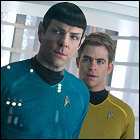 TV division reclaims Star Trek for the small screen (probably around the end of the decade), we won’t get an extension of the J.J. Abrams reboot but instead yet another rethink from the ground up.
TV division reclaims Star Trek for the small screen (probably around the end of the decade), we won’t get an extension of the J.J. Abrams reboot but instead yet another rethink from the ground up.
But that potential needs a much more original voice to reach that potential. Perhaps the next movie will prove that Star Trek does indeed exist in an alternate timeline now, one in which the odd-numbered movies are considered the highlights.
Cast: Chris Pine (James T. Kirk), Zachary Quinto (Spock), Zoe Saldana (Uhura), Karl Urban (Dr. Leonard McCoy), Simon Pegg (Scotty), John Cho (Sulu), Benedict Cumberbatch (Khan), Anton Yelchin (Chekov), Bruce Greenwood (Admiral Christopher Pike), Peter Weller (Admiral Marcus), Alice Eve (Carol Marcus), Noel Clarke (Thomas Harewood), Nazneen Contractor (Rima Harewood), Amanda Foreman (Ensign Brackett, Jay Scully (Lt. Chapin), Jonathan H. Dixon (Ensign Froman), Aisha Hinds (Navigation Officer Darwin), Joseph Gatt (Science Officer 0718), Jeremy Raymond (Lead Nibiran), Tony Guma (Nibiran), Sean Blakemore (Klingon), Nick Tarabay (Klingon), Beau Billingslea (Captain Abbot), Deep Roy (Keenser), Anjini Taneja Azhar (Lucille Harewood), Jack Laufer (Doctor), Katie Cockrell (Girl), Kellie Cockrell (Girl), Jason Matthew Smith (Cupcake), Seth Ayott (Enterprise Shuttle Ensign), Marco Sanchez (Torpedo Security), Lee Reherman (Uniformed Security), Scott Lawrence (Vengeance Officer), Usman Ally (Vengeance Officer), Nolan North (Vengeance Bridge Officer), James Liao (Vengeance Bridge Officer), Rob Moran (Vengeance Ensign), Akiva Goldsman (Starfleet Admiral), Christopher Doohan (Transport Officer), Andy Demetrio (Enterprise Bridge Crew), Gianna Simone (Enterprise Bridge Crew), Rene Rosado (Enterprise Bridge Crew), Jacqueline King (Enterprise Bridge Crew), Long Tran (Enterprise Bridge Crew), Ningning Deng (Enterprise Bridge Crew), Paul K. Daniel (Shuttle Pilot), Ser’Darius Blain (Enterprise Red Shirt), Heather Langenkamp (Moto), David C. White (Enterprise Crew), Melissa Paulo (Bar Girl), Cynthia Addai-Robinson (San Francisco Woman), Drew Grey (San Francisco Bar Patron), Charles Haugk (San Francisco Resident), Max Chernov (San Francisco Resident), Mark Primiano (San Francisco Resident), Jesper Inglis (San Francisco Resident), Jacob Rhodes (Nibiru Child), Anthony Wilson (Shaku), Eric Greitens (Starfleet Ceremonial Guard), Adam McCann (Starfleet Ceremonial Guard), Gerald W. Abrams (Starfleet Memorial Admiral), James McGrath (Starfleet Memorial Admiral), Leonard Nimoy (Spock)
Notes: Star Trek Into Darkness revives the character of Khan from Space Seed and Star Trek II, but this time does not specify the Eugenics Wars of the original Star Trek timeline as the source of Khan and his genetically engineered superhumans, simply that they were augmented to serve as soldiers in an unspecified conflict; in this timeline, rather than stealing the Botany Bay, Khan and his fellow augments have been kept frozen on Earth for over 300 years in the vaults of Starfleet’s Section 31 skunkworks. In the original Star Trek timeline, Section 31 was established in the 24th-century-based Star Trek: Deep Space Nine, though it was later shown to have existed at least as early as the 22nd century of Star Trek: Enterprise (which may or may not be part of this alternate timeline, given that the timeline diverges as early as the 21st century and the fate of Khan and his people). Benicio del Toro was originally sought to play the part of Khan, but declined; he was later recast with Sherlock star Benedict Cumberbatch. Actor Noel Clarke is a familiar genre face, having co-starred as TARDIS traveler Mickey Smith during the first and second seasons of the revived 21st century Doctor Who. Blink-and-you’ll-miss-him Enterprise transporter chief Chris Doohan is the son of the original series’ Scotty, James Doohan; he also plays the role of Scotty in the fan series Star Trek Continues.



